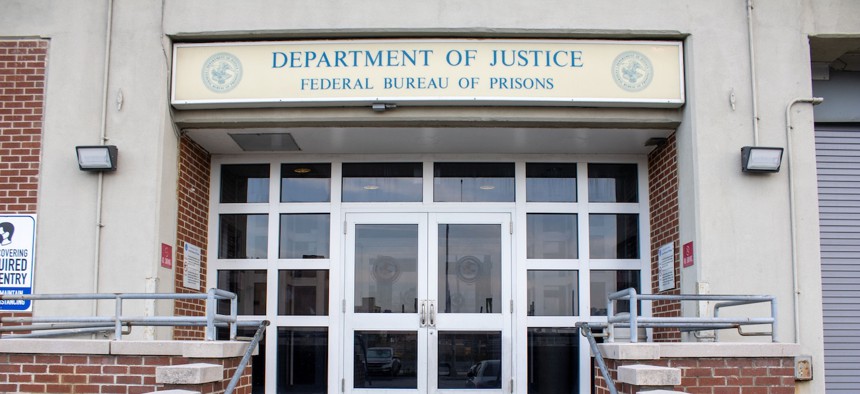
U.S. Bureau of Prisons Chief William Marshall blamed BOP unions for the agency’s chronic low performance in the Federal Employee Viewpoint Survey. Getty Images
Bureau of Prisons the latest federal agency to cancel its union contracts
Labor leaders said the effort to bust their union is particularly ill-timed, given the prospect of a government shutdown that could begin as soon as Wednesday.
The U.S. Bureau of Prisons last week became the latest agency to formally cancel its collective bargaining agreements with federal employee unions, implementing President Trump’s executive order aimed at outlawing labor groups for two-thirds of the federal workforce.
The action stems from Trump’s March executive order citing a seldom-used provision of the 1978 Civil Service Reform Act to ban unionization at most federal agencies under the auspices of national security. The edict, and the August follow-up broadening its scope to another half dozen agencies, has been the subject of intense litigation, though federal appellate courts have—with one exception—allowed the administration to proceed with implementation while those lawsuits work their way through the judiciary.
In a blog post announcing the move, U.S. Bureau of Prisons Chief William Marshall said that he came from a “pro-union family” but blamed BOP unions, represented by the American Federation of Government Employees, for the agency’s chronic low performance in the Federal Employee Viewpoint Survey.
“The coal miners and steel workers I knew stood together, fought for safer conditions and made life better for their families. That’s the kind of union I will always support,” Marshall wrote. “But when a union becomes an obstacle to progress instead of a partner in it, it’s time for change. And today, thanks to President Donald J. Trump and Attorney General Pamela Bondi, we’re making that change. Today, I’m announcing the termination of our contracts with [the Council of Prison Locals C-33] effective immediately.”
Marshall sought to reassure employees that their pay, civil service protections and other benefits will remain in place despite the barring of unions. But federal workers’ collective bargaining rights entitle them to union representation during investigatory interviews and disciplinary proceedings, something they now will be denied.
“In the coming days, we will spell out exactly how we move forward from here, but the bottom line is CPL-33 didn’t give you your protections, the law did, and Bureau policy continues them,” he wrote. Those safeguards aren’t going anywhere. This isn’t about taking things away. It’s about giving you more. More clarity. More fairness. More respect.”
The revocation of Bureau of Prisons employees’ collective bargaining agreement means the deletion of provisions aimed at safeguarding workers from unsafe working conditions and the understaffing that often befalls federal prisons, many of which are in remote locations.
It also marks a departure from the collaborative relationship seen at some prisons, where labor and management worked together to lobby the Federal Salary Council each year for better locality pay to help attract and retain workers. And it comes just days before correctional officers will likely be ordered to work without timely pay as Congress appears set to trigger a government shutdown Wednesday.
“This is not just an attack on our union—it is an attack on every federal employee who serves this country with dedication and sacrifice,” said Brandy Moore White, president of AFGE’s Council of Prison Locals. “The collective bargaining agreement is the foundation that ensures fair treatment, workplace protections and a voice for our staff. Removing it undermines the very principles of fairness and democracy in the workplace. Don’t be fooled, this is not about efficiency or accountability—this is about silencing our voice.”
In a letter to lawmakers Monday, Don Williams, whose son Eric was killed by an inmate at U.S. Penitentiary Canaan in Pennsylvania in 2013, called the notion that unions were an impediment to progress at the Bureau of Prisons an “insult.” Eric was unarmed when he was killed, and the union for years had been fighting management “stonewalling” to equip correctional officers with pepper spray.
“I, along with some family members of two other fallen officers, began working closely with the Council of Prison Locals to have legislation passed to provide the necessary tools and staffing levels to help prevent another tragedy like Eric,” Williams wrote. “Finally, after years of fighting for legislation, the officers finally were able to carry pepper spray. However, the battle for safe staffing levels, prevention of transdermal poisoning in mail rooms, drones dropping contraband, staff fatigue from mandated overtime, assaults on staff and criminal activities being carried out by contraband cell phones are all issues the union ahs been fighting for to no avail.”
Moore White and AFGE National President Everett Kelley vowed to take “every legal and legislative action” needed to roll back both the U.S. Bureau of Prison’s contract cancellation and the overarching executive order greenlighting it.
“The correctional officers and staff who oversee the more than 142,000 inmates housed by the Federal Bureau of Prisons in 122 facilities nationwide work in some of the most challenging and dangerous conditions imaginable--making it all that more deplorable that this administration has seen fit to strip them of their union contract,” Kelley said. “[Stripping] federal correctional officers and other BOP employees of their union contract will make it that much harder for them to highlight and address the staffing shortages, workplace dangers, and other issues that they face on a daily basis.”
Share your news tips with us: Erich Wagner: ewagner@govexec.com; Signal: ewagner.47
NEXT STORY: Layoff implementation work is exempted from shutdown, Trump admin says







